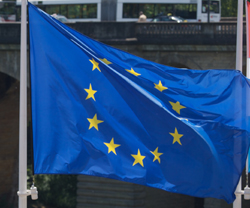Politics
Bank levy negotiated
 In early March the German Cabinet brought a draft on the bank levy onto the road. Central to the regulation is that German banks should in future pay into a so-called Special Financial Market Stabilization Fund (FMSA). The contribution is based on the total assets of the bank, as well as the risk that a bankruptcy of the institution would bring. According to the bill, the finance houses must in future, even if they enter a loss in their financial statements under the Commercial Code (HGB), pay a minimum contribution of five percent of the regulation amount. What is new is an additional payment obligation for at least three but not more than five years for amounts non-paid in bad years. Thus, banks that should according to regulations pay more will in profitable years make up the difference due. However, a reasonable limit of 15 percent of profit earned applies, and may not be exceeded. The objective of the Fund is in future to save systemically important banks in a precarious situation, without asking the taxpayers to pay. In normal years around one billion euros is to be paid into the fund and the fund's assets should thus grow to up to 70 billion euros. As well as the private banks, savings banks and cooperative banks must pay into the Fund, even if they are not systemically relevant and therefore, cannot request funding from the Fund in the event of loss. The savings banks and cooperative banks are therefore threatening to fight the levy right up to the Federal Constitutional Court. The bank levy is part of the Restructuring Act and should pass the Bundestag and Bundesrat by July. By 30 September the banks will be given their first notifications. The Deutsche Bank alone is likely to be asked to pay €500 million.
In early March the German Cabinet brought a draft on the bank levy onto the road. Central to the regulation is that German banks should in future pay into a so-called Special Financial Market Stabilization Fund (FMSA). The contribution is based on the total assets of the bank, as well as the risk that a bankruptcy of the institution would bring. According to the bill, the finance houses must in future, even if they enter a loss in their financial statements under the Commercial Code (HGB), pay a minimum contribution of five percent of the regulation amount. What is new is an additional payment obligation for at least three but not more than five years for amounts non-paid in bad years. Thus, banks that should according to regulations pay more will in profitable years make up the difference due. However, a reasonable limit of 15 percent of profit earned applies, and may not be exceeded. The objective of the Fund is in future to save systemically important banks in a precarious situation, without asking the taxpayers to pay. In normal years around one billion euros is to be paid into the fund and the fund's assets should thus grow to up to 70 billion euros. As well as the private banks, savings banks and cooperative banks must pay into the Fund, even if they are not systemically relevant and therefore, cannot request funding from the Fund in the event of loss. The savings banks and cooperative banks are therefore threatening to fight the levy right up to the Federal Constitutional Court. The bank levy is part of the Restructuring Act and should pass the Bundestag and Bundesrat by July. By 30 September the banks will be given their first notifications. The Deutsche Bank alone is likely to be asked to pay €500 million.
EU stress test still unclear
 After banks from Ireland were under the stress test last year judged to be robust, only to collapse a little later, the European Union wants to do better now with the new edition. By 15 April, 13 German banks and 75 other European institutions are to take a stress test and submit their stress-test forms to national banking watchdogs. It is unclear, however, whether as in the first stress test for the core capital ratio hybrid instruments such as the silent government contributions at Commerzbank will also be counted towards the core capital ratio. In addition to the equity cushion, liquidity is also to be tested for. However, it is still controversial how the risk of state failures is to be simulated in the bank test. Specifically, it is discussed whether as well as the trading book, in which short-term investments are entered at fair value, the banking book should also be used. Here bonds held long-term, and thus also government bonds, are usually accounted for. If discounts on these bonds are calculated here, this would amount to a simulation of a national bankruptcy. The question remains whether, and if so which, results of the tests are to be published, because a bad liquidity result could discredit a bank and affect inter-bank transactions. A recent criticism from EU Monetary Affairs Commissioner Olli Rehn was that EU states had not adequately prepared for the results of the bank test. Like the head of European banking supervisors Andrea Enria, Rehn calls for an emergency mechanism, in which the individual states set out how to deal with failed banks, for example through recapitalization by government rescue funds. Germany closed its bank rescue fund Soffin in late 2010 and instead, like Britain, Ireland and Denmark, introduced a new bank insolvency law, which will cut in if the private owners cannot be asked to pay, say through bonuses and dividend cuts. Enria calls for consequences for near-failures too. The results of the new tests are expected in June.
After banks from Ireland were under the stress test last year judged to be robust, only to collapse a little later, the European Union wants to do better now with the new edition. By 15 April, 13 German banks and 75 other European institutions are to take a stress test and submit their stress-test forms to national banking watchdogs. It is unclear, however, whether as in the first stress test for the core capital ratio hybrid instruments such as the silent government contributions at Commerzbank will also be counted towards the core capital ratio. In addition to the equity cushion, liquidity is also to be tested for. However, it is still controversial how the risk of state failures is to be simulated in the bank test. Specifically, it is discussed whether as well as the trading book, in which short-term investments are entered at fair value, the banking book should also be used. Here bonds held long-term, and thus also government bonds, are usually accounted for. If discounts on these bonds are calculated here, this would amount to a simulation of a national bankruptcy. The question remains whether, and if so which, results of the tests are to be published, because a bad liquidity result could discredit a bank and affect inter-bank transactions. A recent criticism from EU Monetary Affairs Commissioner Olli Rehn was that EU states had not adequately prepared for the results of the bank test. Like the head of European banking supervisors Andrea Enria, Rehn calls for an emergency mechanism, in which the individual states set out how to deal with failed banks, for example through recapitalization by government rescue funds. Germany closed its bank rescue fund Soffin in late 2010 and instead, like Britain, Ireland and Denmark, introduced a new bank insolvency law, which will cut in if the private owners cannot be asked to pay, say through bonuses and dividend cuts. Enria calls for consequences for near-failures too. The results of the new tests are expected in June.
More women without a quota?
 Increasing the share of women in Germany's business continues to be controversial. At a summit meeting of the 30 DAX companies, Chancellor Angela Merkel (CDU) invited the ministers too. They came with very different objectives. Thanks to Merkel, Family Minister Kristina Schröder (CDU) was able to prevail, after wrangling against Labour Minister Ursula von der Leyen (CDU) in the run-up: instead of a fixed statutory scheme Schroeder relies on commitments by companies. She came to meet corporations with a phased plan with flexible arrangements, and merely appealed for the number of women on management and supervisory boards to be tripled by 2013. The CDU lady is expecting the DAX companies to set their own targets this year. If this fails, Schroeder will in 2013 enshrine a legal commitment in which companies set themselves binding target quotas, by which they are then also measured. Schroeder calls this the “Flexi-quota.” Von der Leyen was visibly disappointed, wanting clear targets and objectives on the part of companies; she would already have set a quota of 30 percent. The EU Commission too eyed Schroeder's plan very critically. EU Justice Commissioner Viviane Reding said in a letter to expectant mothers that the EU would give companies only until March 2012 for voluntary solutions. Thereafter, if necessary, Reding wants to get tough, with legal instruments such as an EU directive, which Germany would then have to implement. Reding is aiming at raising the proportion of women on the supervisory boards of European listed companies to 30 percent by 2015 and to 40 percent by 2010. In Germany so far only 13 percent of supervisory board members are women, and only five out of 187 Dax executives female. The SPD criticized the summit meeting as a “placebo event”; the Greens found voluntary commitments inadequate. The Bitkom association, however, warned that in the IT and telecommunications industry statutory quotas for women are unlikely to be to achievable.
Increasing the share of women in Germany's business continues to be controversial. At a summit meeting of the 30 DAX companies, Chancellor Angela Merkel (CDU) invited the ministers too. They came with very different objectives. Thanks to Merkel, Family Minister Kristina Schröder (CDU) was able to prevail, after wrangling against Labour Minister Ursula von der Leyen (CDU) in the run-up: instead of a fixed statutory scheme Schroeder relies on commitments by companies. She came to meet corporations with a phased plan with flexible arrangements, and merely appealed for the number of women on management and supervisory boards to be tripled by 2013. The CDU lady is expecting the DAX companies to set their own targets this year. If this fails, Schroeder will in 2013 enshrine a legal commitment in which companies set themselves binding target quotas, by which they are then also measured. Schroeder calls this the “Flexi-quota.” Von der Leyen was visibly disappointed, wanting clear targets and objectives on the part of companies; she would already have set a quota of 30 percent. The EU Commission too eyed Schroeder's plan very critically. EU Justice Commissioner Viviane Reding said in a letter to expectant mothers that the EU would give companies only until March 2012 for voluntary solutions. Thereafter, if necessary, Reding wants to get tough, with legal instruments such as an EU directive, which Germany would then have to implement. Reding is aiming at raising the proportion of women on the supervisory boards of European listed companies to 30 percent by 2015 and to 40 percent by 2010. In Germany so far only 13 percent of supervisory board members are women, and only five out of 187 Dax executives female. The SPD criticized the summit meeting as a “placebo event”; the Greens found voluntary commitments inadequate. The Bitkom association, however, warned that in the IT and telecommunications industry statutory quotas for women are unlikely to be to achievable.















